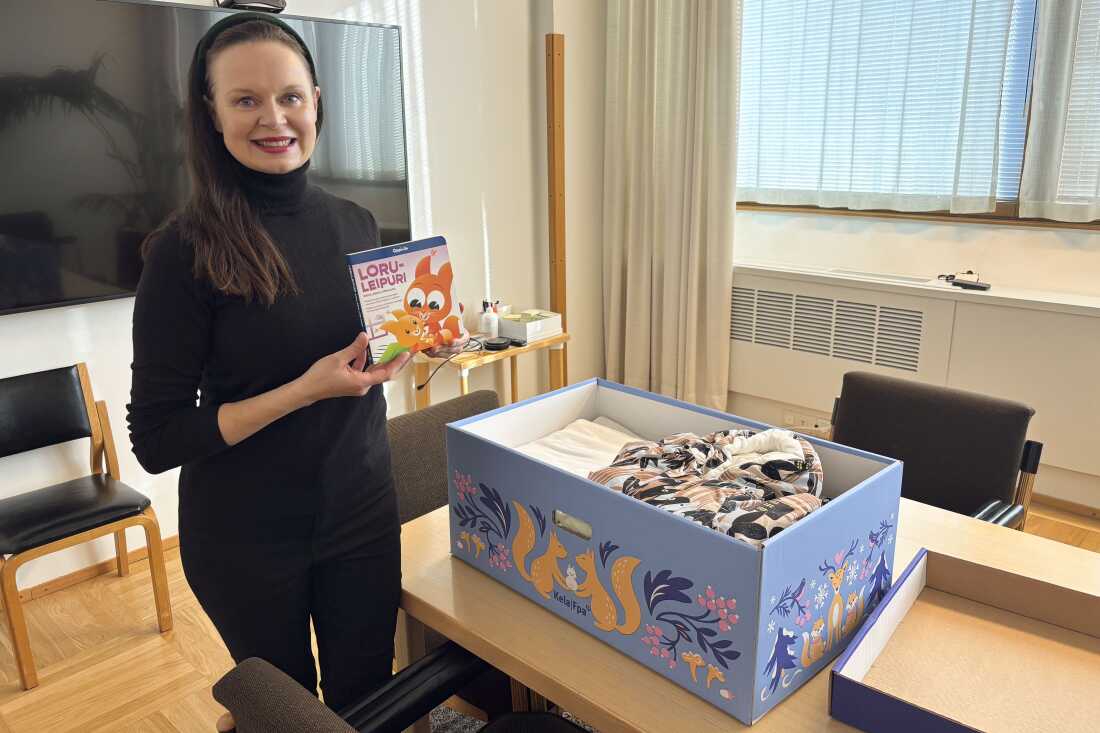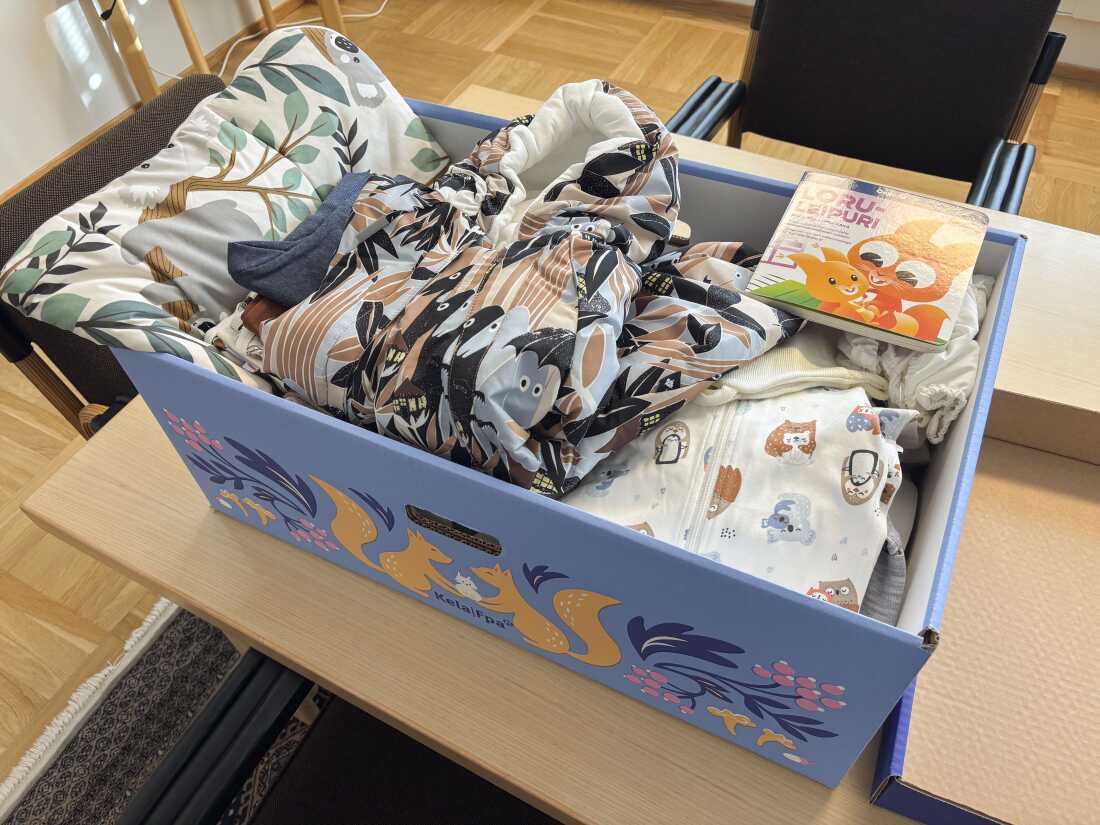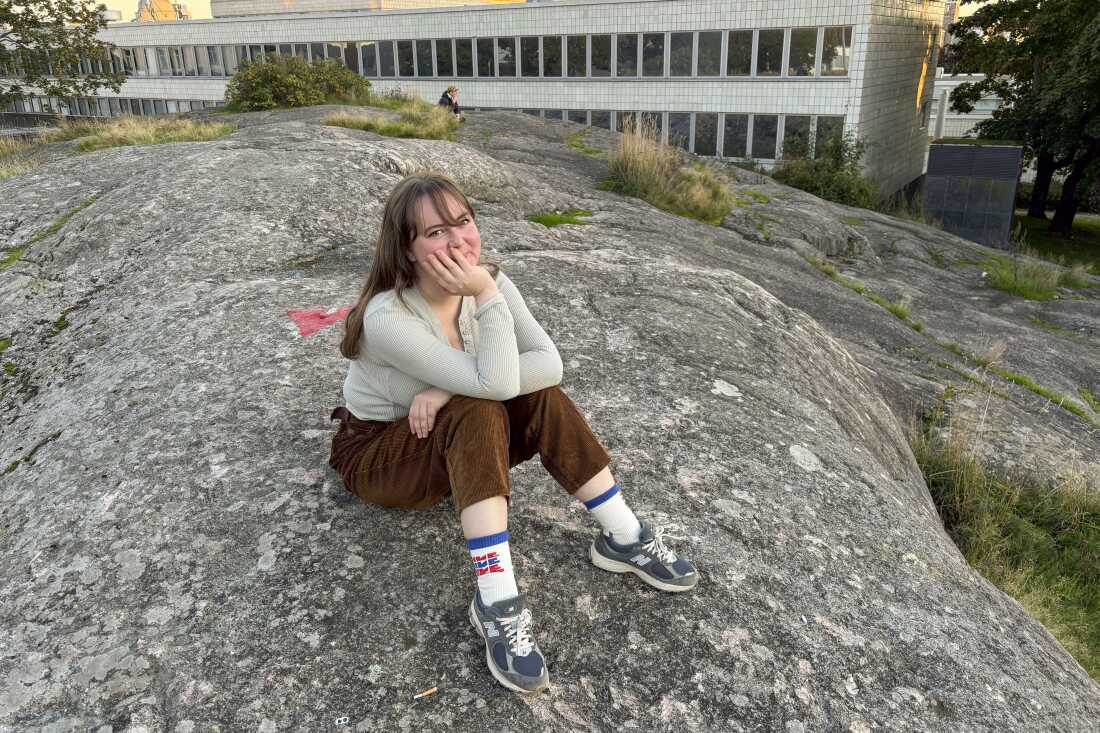Poa Pohjola, 38, and Wilhelm Blomberg, 35, of Helsinki, welcomed their first child in July. After initially hesitating to have a baby, Pohjola says she realized in her mid-30s that she wished to grow to be a mom, and Blomberg agreed.
Sarah McCammon/NPR
disguise caption
toggle caption
Sarah McCammon/NPR
Households within the U.S. and world wide are having fewer kids as individuals make profoundly totally different choices about their lives. NPR’s sequence Inhabitants Shift: How Smaller Households Are Altering the World explores the causes and implications of this development.
On a transparent however chilly autumn day, Poa Pohjola and her associate Wilhelm Blomberg are stress-free of their Helsinki residence whereas their child naps outdoors on the balcony, in conventional Finnish fashion.
“They sleep very effectively outdoors, in colder levels, I feel,” Pohjola mentioned with fun. “Or, that is how I grew up pondering.”
Pohjola is 38 and Blomberg is 35. They have been collectively for about three years, they usually began speaking about having a child early on – although Pohjola had as soon as thought she would possibly by no means have youngsters.
“I feel I used to be denying that for myself as a result of it appeared [like] one thing that will be not possible to have,” she mentioned.

In her 20s, Pohjola says she struggled to determine what she wished from life. By the point she met Blomberg, she knew the window of alternative to grow to be pregnant was closing due to her age.
However one night time, the couple talked about their needs for his or her future, and he or she informed Blomberg she thought she wished a child. He agreed.
Blomberg says they each felt able to be mother and father.
“One, in a method, convincing argument was that each of us have had time to, like, roam round and do what we would like in life,” he defined.
Researchers say Finnish persons are more and more delaying having kids, or not having them in any respect. The nation’s “complete fertility charge” — a technical time period utilized by demographers — has fallen to historic lows in recent times. Though there have been some indicators of a potential rebound in latest months, the quantity stays lower than 1.3 kids per girl — effectively beneath the substitute stage of two.1 wanted to keep up a gentle inhabitants.
That is regardless of the Nordic area’s status for offering paid break day for each moms and dads, together with childcare and different help. As households world wide are having fewer kids, even Europe is seeing a significant drop in beginning charges regardless of these beneficiant, publicly funded advantages.
Amongst different issues, meaning much less demand for Finland’s iconic child bins.

Eeva Patomeri, a spokesperson for Kela, Finland’s taxpayer-funded social insurance coverage company, says the federal government has been distributing “child bins” crammed with clothes and different toddler provides because the Thirties. However she says the demand has declined together with the beginning charge.
Sarah McCammon/NPR
disguise caption
toggle caption
Sarah McCammon/NPR
“It has a great deal of winter garments, a great deal of summer time garments, a great deal of child care gadgets, one thing for mothers,” mentioned Eeva Patomeri, a spokesperson for Kela, Finland’s taxpayer-funded social insurance coverage company.
They have been handing out the bins because the Thirties and there is a re-creation of the field every year. However many new mother and father had been nonetheless getting final yr’s field effectively into 2025 as a result of Kela nonetheless had so many left over from 2024.
“Typically the field, we begin delivering it in spring, and now it was August, and that is due to low beginning charges,” Patomeri mentioned, including extra mother and father are selecting money funds in lieu of the field, too.
Advantages for Finnish mother and father go far past free child garments and blankets. Each moms and dads obtain government-subsidized parental depart by way of Kela, low-cost childcare and nationwide healthcare.
Kela’s analysis supervisor, Anneli Miettinen, says traditionally, leaders of the Nordic nations: Finland, together with Denmark, Iceland, Norway and Sweden, thought these insurance policies had been serving to to help comparatively steady beginning charges.
“So we can not actually any longer say that it is our good household insurance policies that designate good fertility within the Nordics,” she mentioned.

Together with Finland’s iconic child bins crammed with provides, Finland’s authorities provides new mother and father taxpayer-funded advantages together with paid parental depart, low-cost subsidies, and nationwide healthcare.
Sarah McCammon/NPR
disguise caption
toggle caption
Sarah McCammon/NPR
Births have fallen throughout the area, with Finland’s falling to the bottom charge among the many 5 nations — down by a 3rd since 2010.
“What’s puzzling researchers, is how this could possibly be true, as a result of all of those nations are comparatively good in offering help to households,” Miettinen mentioned, “however there aren’t actually excellent explanations for the very low fertility charges at current.”

Immigration has offset a few of the decline, however officers in Finland, like many different nations dealing with this world development, are nonetheless anxious about an getting older inhabitants, a shrinking workforce and strain on the pension system.
Anna Rotkirch, with the nonprofit Household Federation of Finland authored a report final yr commissioned by the Finnish authorities, which outlined potential causes and coverage options. Rotkirch says her analysis suggests a niche between what younger individuals say they need from life and the households they in the end kind.
“We go to varsities; you discuss to 17-year-olds, and we’re like, ‘What can be your ideally suited household? In order for you a household in any respect, what can be your ideally suited life?'” she defined.
“You get these, surprisingly, in a method, normative perceptions,” she added. “You realize, ‘I need a small home with a canine and a backyard and a partner and three kids.'”
“And it actually breaks my coronary heart, as a result of I am like, that is not going to occur. If the world goes on prefer it’s now, you realize, half of you, that is simply not going to occur,” she mentioned.
Disconnected and financially unsure amid household planning
Rotkirch says there seem like many potential causes for this decline. Many younger persons are specializing in their schooling and careers. Those that have kids are having them later. Rotkirch says younger individuals are also having a more durable time forming relationships, and a few researchers assume know-how is partly responsible.
“Screens are away from precise bodily, embodied interactions, and it is in these interactions that infants get made and likewise individuals fall in love,” she defined. “The bodily a part of our humanity is clearly at stake.”
Milla Tuokkola, a 34-year-old tv author in Helsinki, says she’s tried relationship on-line. However too usually, she says, she’s been harassed and subjected to degrading language.
“They’re simply very porn-brained…objectifying,” she mentioned of the lads she’s assembly on-line and on relationship apps. “I really feel like they’re being radicalized on-line once they’re younger.”
Tuokkola is divorced. Typically, she thinks she’d prefer to have a baby, however she’s had hassle assembly the fitting associate.
“They do not appear a protected, dependable choice to have a baby with,” she mentioned.

Milla Tuokkola, 34, a tv author in Helsinki, says she’s open to having a baby however she has struggled to search out the fitting associate
Sarah McCammon/NPR
disguise caption
toggle caption
Sarah McCammon/NPR
Some younger adults say when they consider having kids, additionally they fear in regards to the bigger state of the world, whether or not local weather change or the economic system.
Anselmi Auramo, 28, is a pupil in Helsinki. He is engaged to be married, and plans to grow to be a father sooner or later, however says he is undecided when he’ll be financially prepared. He believes monetary issues trigger many younger individuals to assume twice about having kids.
“Whether or not it is [the] American dream or Finnish dream or no matter it’s, it appears so distant, and also you anticipate to have that in an effort to have the household,” he mentioned.
Answering a worldwide query
Finland’s wrestle to spice up household measurement matches what many different nations are experiencing. From authoritarian regimes like China and Russia to progressive nations like Canada and Finland, governments have tried a spread of insurance policies designed to encourage increased beginning charges.
However consultants say even the most costly makes an attempt at coverage options have proven restricted or no success.
Miettinen, with Kela, says there’s not one, single motive why younger persons are having fewer kids, and there will not be a single answer to reversing the development, both.
“Most of these insurance policies might not be sufficient any longer, however we have to invent one thing else to help younger adults,” she mentioned.

Rotkirch, with the Household Federation, says in the end, these choices are within the fingers of youthful generations.
“However what we are able to do because the aged generations and what the coverage makers can do is admittedly prioritize this,” Rotkirch mentioned. “Prioritize listening to younger individuals – their needs for household formation – and help them.”
For Poa Pohjola and Wilhelm Blomberg, the couple with the brand new child, there are fears in regards to the future. Pohjola remembers Finland’s monetary disaster within the early Nineties, and worries about financial stability.
Blomberg says he thinks about local weather change and rising authoritarianism world wide.
“We’re in such turbulent occasions, and it is arduous to, like, have a way you could management issues,” he mentioned. “And one factor you may management is whether or not you are having a child or not, as it is so arduous to foretell what the long run will deliver.”
Nonetheless, they’re speaking about having one other youngster; Blomberg has a brother he is very near, and he’d like to present their son a sibling, too.
Pohjola is barely extra hesitant.
“Once I begin overthinking it, I am like, ‘Okay, we would wish to have this youngster fairly soonish, after which now we have a toddler and a child,” she mentioned. “And okay, we can’t be sleeping, so it is gonna be a whole lot of work.”
However, now that she’s had one child, she mentioned, she’s inclined to have one other.
NPR’s Brian Mann contributed to this story.

